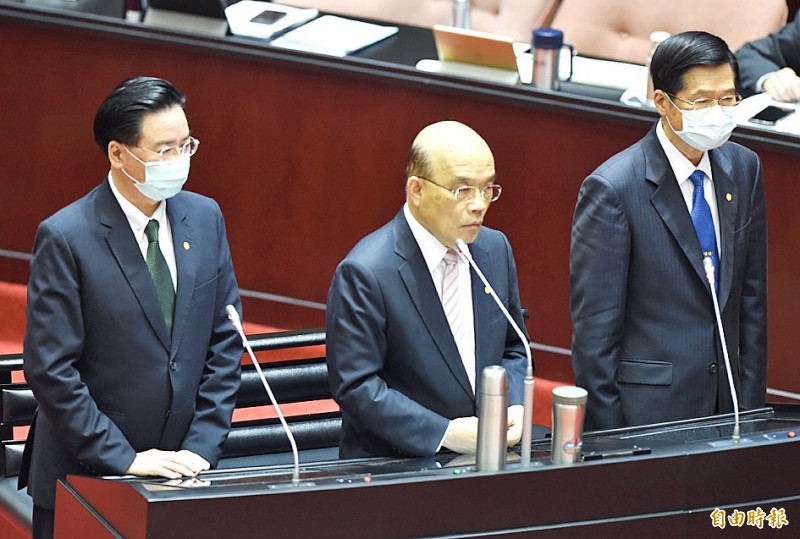《TAIPEI TIMES》Taiwan will resist ‘one country, two systems’: premier

Premier Su Tseng-chang, center, speaks at the Legislative Yuan in Taipei yesterday as Minister of Foreign Affairs Joseph Wu, left, and Minister of National Defense Yen De-fa look on. Photo: Chien Jung-fong, Taipei Times
By Sean Lin / Staff reporter
Premier Su Tseng-chang (蘇貞昌) yesterday said that Taiwan would steadfastly resist Beijing’s “one country, two systems” framework and vowed to defend the nation’s democracy.
His Cabinet would follow President Tsai Ing-wen’s (蔡英文) instructions to engage with China on the principles of freedom, parity and democracy, thereby facilitating positive exchanges, Su said in an administrative report to the legislature.
The government would reject Chinese attempts to belittle Taiwan by imposing its framework on it, he said.
It would closely monitor the situation in Hong Kong, provide people there with humanitarian assistance, and invite Hong Kong capital and professionals to Taiwan, he said.
The government would continue to pursue “practical diplomacy” by reinforcing ties with Taiwan’s allies while expanding collaborations with like-minded nations, including the US, the EU and Japan, Su said.
The government would develop a “multilateral model for collaboration” to defend the nation and improve its defense capabilities — for example by teaming up with the private sector to build military vessels and airplanes, which would help boost local industries, he said.
The COVID-19 pandemic has led many nations to realize the importance of self-sufficiency, he said, adding that some are advanced countries that excel at engineering, but desperately lack basic necessities such as masks — of which Taiwan is a leading provider.
Some nations have tried to combat the novel coronavirus, but have faced obstacles, as core pharmaceutical and medical technologies are controlled by China, Su said.
Therefore, the government would not only ensure that Taiwan can achieve self-sufficiency in food and energy supply, as well as other daily necessities, but also form a team to provide or market such resources overseas, he said.
Su said that his Cabinet would help further develop the nation’s democracy and make Taiwan a “land of bliss in tumultuous times.”
Taiwan Statebuilding Party Legislator Chen Po-wei (陳柏惟) asked Su whether the nation has policies to welcome Hong Kong talent and capital after China implements new national security laws in the territory.
The government has prepared to welcome Hong Kong companies, capital and talent in many areas, Su said.
Separately, Taiwan criticized the Chinese government for commemorating its 2005 passage of a law authorizing “non-peaceful means” to prevent Taiwanese independence.
At a forum marking 15 years of China’s “Anti-Secession” Law, Chinese National People’s Congress Standing Committee Chairman Li Zhanshu (栗戰書) said that Beijing remains committed to “one country, two systems” and “peaceful reunification,” but said the act provided grounds for taking “necessary measures” if Taiwan persisted in pushing for independence.
Taiwan’s Mainland Affairs Council said in a press release that the Chinese law was merely an attempt to impose “unilateral legal measures to decide the future of cross-strait” relations, and gave China “carte blanche for the use of force against Taiwan.”
Rather than persisting with a “one country, two systems” model that is rejected by 23 million Taiwanese, Beijing should accept “peace, parity, democracy and dialogue” as the basis of cross-strait interaction, the council said.
Su likened the unpopularity of the Chinese act to the reaction to its national security legislation for Hong Kong, which he said would only further isolate China internationally.
Minister of National Defense Yen De-fa (嚴德發) told lawmakers that China this year had made eight threatening maneuvers in the Taiwan Strait.
However, Taiwan’s military is monitoring the situation closely, making “the best preparations for the worst contingencies,” Yen said.
Additional reporting by CNA
新聞來源:TAIPEI TIMES












